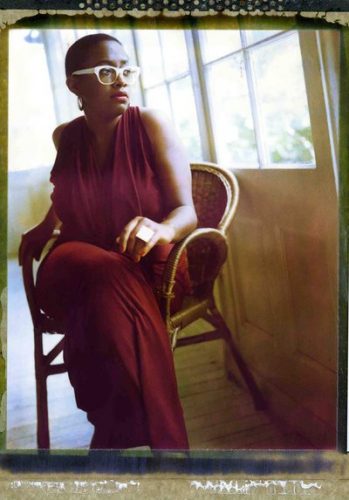
Cécile McLorin Salvant has gone from rising to shooting star in the world of jazz. The New York Times has heaped praise on the vocalist, declaring her the heir to the legacy of the “Big Three,” Billie Holiday, Sarah Vaughan and Ella Fitzgerald. The 24-year-old French-American jazz singer won the prestigious Thelonious Monk Jazz Competition in 2010, and her first distributed album, 2013’s WomenChild, was a 2014 Grammy nominee. Now, she comes to Oregon for the first time, performing her debut concert at The Shedd Feb. 21. EW caught up with Salvant before she kicked off her West Coast tour.
When did you first get involved in music?
When I was a kid I always sang. I took piano lessons from the age of 4 years old. I was really interested in classical singing so I started taking classes after school when I was a teenager. I always really liked the voice, the human voice … As a kid I would watch the Disney movies and really be into all the songs.
Classical singing is a rare teenage interest. What sparked it for you?
One day I was watching TV and I saw this girl, Charlotte Church, singing … I thought it was amazing that somebody so young could really move people to tears with a voice and singing this classical repertoire. And my mom always liked classical singing so I had that in my ear. I was just dumbfounded and thought it was something I could do.
You grew up in Miami with a French mother and a Haitian father. You’ve studied music in France. How has geography had an effect on your music? Does it play a role?
Being brought up in the family that I was and music being such a central part of our everyday life — not just French and Haitian music, but music from Senegal, South America and classical to funk to hip hop … That has definitely had a great influence in how I listen to music.
Growing up in Miami, singing jazz didn’t seem at all like a viable option. I was really not in contact with any jazz musicians in Miami growing up. I wasn’t even aware that there was a jazz scene. It’s so not something that is central in people’s lives there. I knew there was Latin jazz. I was much more in contact with Latin music culture.
It just seems it was not accessible to me as it was when I moved to France. [Salvant moved to Aix-en-Provence, France, after high school to study political science and law.] There are jazz festivals all over France … It’s not necessarily like only jazz-fusion or things with Latin elements; they also just like to listen to jazz, jazz from the ’20s. All of a sudden I had banjos in my life! I had no idea that anyone played the banjo. And sousas. I had no idea that was something people still appreciated and still played. Moving to France on that level completely opened my eyes. I don’t think I would have done any of this if I hadn’t moved to France.
What was it like studying music in France?
I ended up meeting the jazz teacher [Jean-François Bonnel] there because I was urged by my mom to try to audition for the jazz class … He forced me into that audition. I really didn’t want to go … I was so shy and so completely disoriented. He was telling me I had to scat and learn how to play the piano and listen to all these musicians and singers. He was absolutely the most important thing; him and my mom have been hugely important in my life musically.
And your training in Baroque singing in France? How did it inform your jazz singing?
Your relationship to the libretto in Baroque is totally different than in classical … It’s really, really precise. The teacher was a historian of the music … I always had these teachers that were really adamant about interpreting the role. Why is the character singing? What did they do after and before the song? Singing is natural and absurd. What moves you to that crazy act? My Baroque teacher was always very much into the words. Learning how to pronounce the words, even in French, and understanding the lyrics before doing anything else. Those are definitely things that have stayed with me.
You released WomanChild in 2013. How do you choose which songs to cover?
I like songs that have kind of an odd little edge to them. I like songs that are funny. I like songs that haven’t been recorded too often, digging up something that sounds beautiful that maybe has been recorded once or twice but people don’t know it, and I really like having people discover those songs … It always definitely has to be something that I can really identify with.
The track “WomanChild” is your first original song that you didn’t throw away. Why is that?
“WomanChild” was really the first thing that I didn’t hate. I liked the idea of having this very sort of instinctive song come out … To me, it was really important to have that on the album. It’s autobiographical but eventually it came to embody a lot of things that the album is about, that I feel about jazz music — how it does have these two qualities: an intellectual savant quality but it also has this spontaneous, open, childlike naïve instinctive quality to it. n
Cécile McLorin Salvant performs 7:30 to 9:30 pm Friday, Feb. 21, at The Shedd; $12.50-$29. Q&A edited for clarity and length.